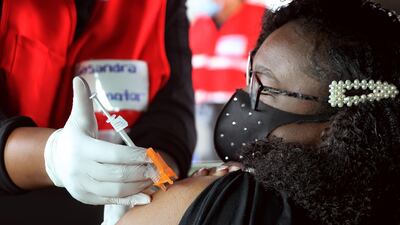Two doses of Pfizer-BioNTech's Covid-19 vaccine provide more than 95 per cent protection against infection, hospital admission, severe illness and death, including among the elderly.
That is the findings of the first national-level assessment of the vaccine's effectiveness in Israel, published in The Lancet.
The analysis, based on national data, also reveals the public health benefits of a national vaccination programme, found to be the main cause of a decline in Covid-19 infections in Israel.
While the findings are encouraging, the authors stress that challenges to controlling the pandemic remain.
The period of immunity to Covid-19, brought on by infection and immunisation, remains unknown, and it is possible that vaccine-resistant variants could emerge.
And achieving herd immunity will require a continued increase of vaccination coverage worldwide.
“As the country with the highest proportion of its population vaccinated against Covid-19, Israel provides a unique real-world opportunity to determine the effectiveness of the vaccine and to observe wider effects of the vaccination programme on public health,” said lead author Dr Sharon Alroy-Preis, of the Israeli Ministry of Health.
“Until this point, no country in the world had described the national public health impact of a nationwide Covid-19 vaccination campaign.
“These insights are hugely important because, while there are still some considerable challenges to overcome, they offer real hope that Covid-19 vaccination will eventually enable us to control the pandemic.”
The analysis said the Pfizer-BioNTech vaccine was highly effective against Covid-19 for all people over the age of 16 years.
It provided 95.3 per cent protection against infection and 96.7 per cent against death seven days after the second dose.
Protection against symptomatic and asymptomatic infection was 97.0 per cent and 91.5 per cent.
The vaccine is also highly effective for preventing the need for hospital treatment and severe illness, at 97.2 per cent and 97.5 per cent.
By 14 days after vaccination, protection from a second dose increased to 96.5 per cent against infection, 98 per cent against the need for hospital treatment and 98.1 per cent against death.
Protection among the elderly were as strong as those for younger people.
The analysis indicated that people over 85 years had 94.1 per cent protection against infection, 96.9 per cent against the need for hospital treatment and 97 per cent against death, seven days after the second dose.
People aged 16 to 44 years had 96.1 per cent protection against infection, 98.1 per cent against the need for hospital treatment and 100 per cent against death.


